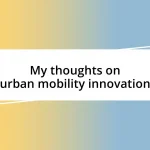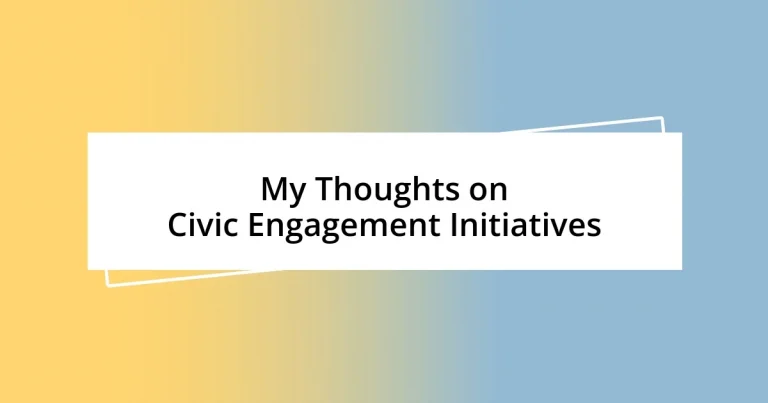Key takeaways:
- Civic engagement fosters community unity and empowers individuals to advocate for change through various initiatives like volunteering and advocacy.
- Successful case studies, such as the Youth Voices Program and Civic Tech Hackathon, illustrate the transformative impact of empowering residents and leveraging technology for social good.
- Future trends in civic engagement include the integration of technology, a focus on inclusivity, and a commitment to sustainability in initiatives, enhancing community participation and awareness.
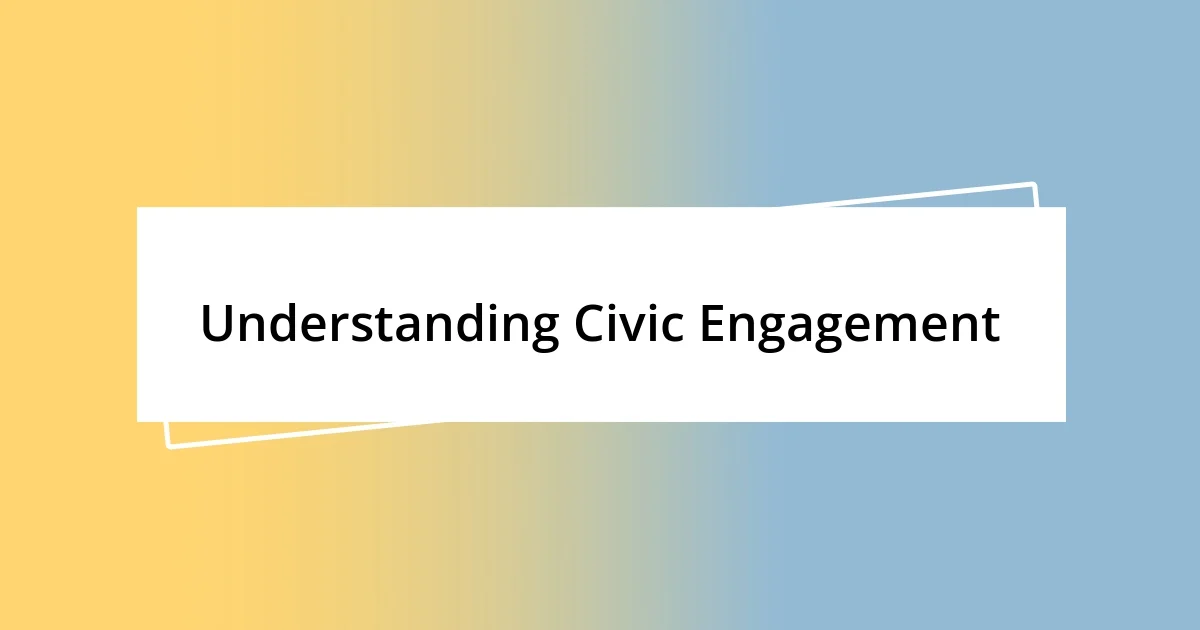
Understanding Civic Engagement
Civic engagement is about individuals taking an active role in their communities and government. I remember participating in a local clean-up event that not only beautified our neighborhood but also fostered a sense of unity among residents. Isn’t it fascinating how a simple act can spark deeper connections and awareness about our surroundings?
At its core, civic engagement empowers people to voice their opinions and advocate for change. I often find myself reflecting on how voting in local elections is a critical way to express my values and priorities. Have you ever thought about what your ballot means for your community’s future?
When people come together for a common cause, the impact can be profound. I once joined a town hall meeting that transformed my understanding of local issues. It’s incredible how discussing our challenges openly can ignite passion and drive collective action, don’t you think?
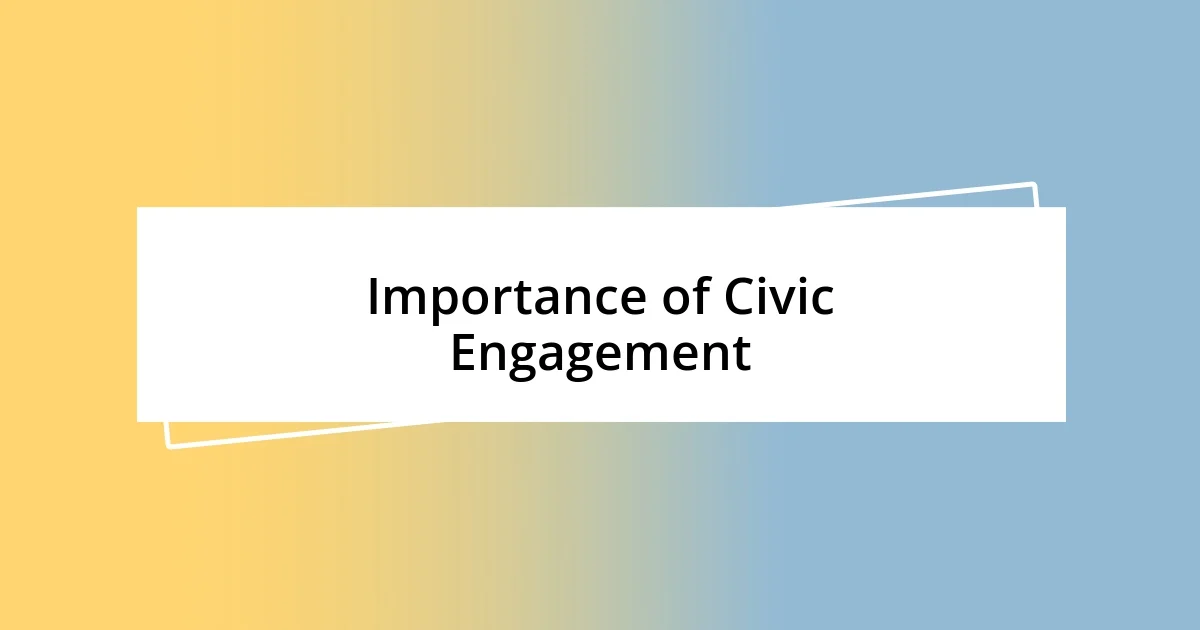
Importance of Civic Engagement
Civic engagement is crucial because it brings people together, fostering a sense of belonging and community responsibility. I recall volunteering at a neighborhood fundraiser, where I met others who shared my passion for supporting local initiatives. That experience truly opened my eyes to the power of collaboration—and how collective efforts can lead to meaningful change.
- It enhances community well-being by addressing local challenges.
- Engaging citizens leads to informed decision-making.
- It encourages diverse perspectives, enriching discussions.
- Participation can inspire future generations to become active leaders.
- Civic engagement strengthens democracy by holding leaders accountable.
By actively participating in civic life, we not only strengthen the fabric of our communities but also cultivate a deeper understanding of the issues we face together. I’ve seen firsthand how my involvement has shaped my perspective, allowing me to appreciate the nuances of various opinions and experiences within my community. It’s a reminder that our voices matter and can spark significant change when we stand united.
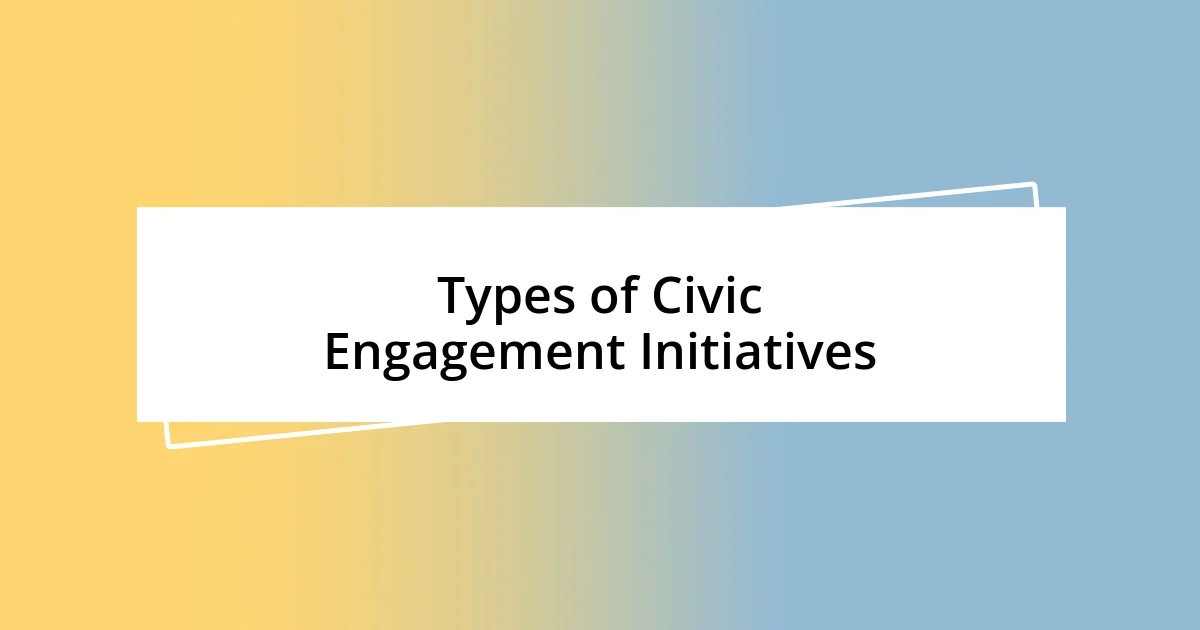
Types of Civic Engagement Initiatives
Civic engagement initiatives can take many forms, and I find it fascinating to see how diverse these efforts can be. For instance, community volunteering is a fantastic avenue for individuals to contribute directly to local needs. I remember volunteering at a soup kitchen, where the smiles of those we served really reminded me of the impact we can have on others’ lives through simple acts of service.
On the other hand, advocacy initiatives are another crucial type of civic engagement. They empower citizens to champion specific causes, whether it’s environmental protection or social justice. I once participated in a rally for climate action, feeling the energy of so many passionate individuals coming together. It was inspiring to witness firsthand how collective voices can pressure lawmakers to act on urgent issues.
Educational programs also represent a vital aspect of civic engagement. These initiatives focus on informing and training citizens about their rights and responsibilities. When I participated in a workshop that educated youth about civic duties, it was heartening to see young faces light up with the realization that they have a role in shaping their community’s future. Such moments show just how important it is to nurture informed and active citizens of tomorrow.
| Type of Initiative | Description |
|---|---|
| Community Volunteering | Direct contribution to local needs, such as food drives and clean-up events. |
| Advocacy Initiatives | Efforts to promote specific causes through rallies, campaigns, or lobbying. |
| Educational Programs | Workshops and seminars aimed at informing citizens about civic rights and responsibilities. |

Successful Case Studies of Initiatives
One initiative that stands out to me is the “Youth Voices Program” in our local community, which focused on empowering high school students to engage in local government. This program not only provided them with the tools to voice their opinions but also facilitated mentorship sessions with local leaders. I vividly remember a student who initially felt timid about public speaking, transforming into a confident advocate by the end of the program. Isn’t it incredible how nurturing young voices can change the landscape of civic participation?
Another inspiring case is the “Neighborhood Clean-Up Challenge,” an event where various neighborhoods compete to improve their surroundings. I participated in my area’s team last year, and it was remarkable to see neighbors who had never spoken to each other come together with a shared purpose. We transformed litter-strewn parks into beautiful spaces, and the pride we felt afterward was palpable. Can you imagine the lasting friendships and connections that blossomed from such a simple yet impactful initiative?
Lastly, the “Civic Tech Hackathon” is worth noting. This event brought together developers, civic-minded citizens, and community leaders to create tech solutions for local challenges. I remember brainstorming ideas to improve public transportation accessibility. The energy in the room was electric, fueled by the determination to utilize technology for social good. It made me realize how blending creativity with civic engagement can lead to innovative solutions that directly benefit our communities. How often do we think about technology as a tool for making our voices heard?
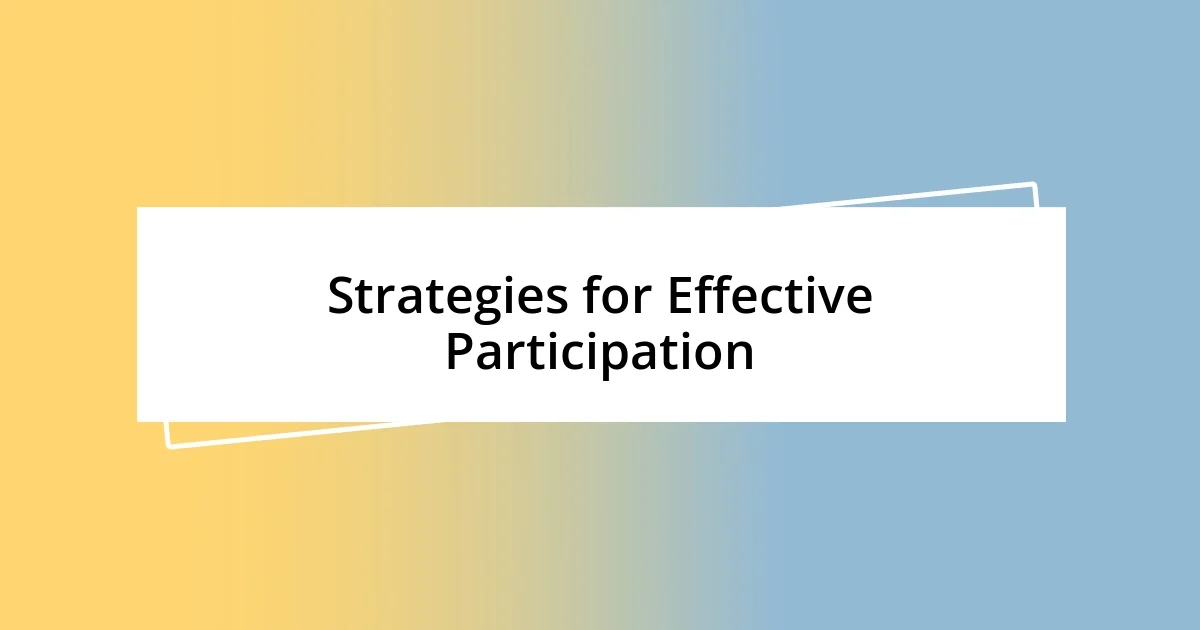
Strategies for Effective Participation
One effective strategy for participating in civic engagement initiatives is to start small. I recall my first community meeting, where I initially felt overwhelmed by the number of voices and ideas bouncing around the room. But as I gradually found my footing, sharing my thoughts on neighborhood safety, I realized that everyone has something valuable to contribute. This experience taught me that even the simplest contributions can spark meaningful conversations, laying the groundwork for impactful collective action.
Another powerful approach is to build relationships through networking. I remember attending a local event where I met several passionate community members, and we exchanged ideas over coffee. This informal setting led to developing friendships that carried into future initiatives. Isn’t it fascinating how genuine connections can amplify our ability to engage effectively? My takeaway is that forging these relationships can foster a strong support system, enhancing our participation and encouraging others to join the cause.
Additionally, harnessing social media as a tool for civic engagement can be tremendously effective. I started sharing updates about community events, and soon, my social media feed transformed into a hub for discussing local issues. Not only did this amplify the reach of our community initiatives, but it also created a dialogue that empowered others to express their views. Have you ever thought about how a simple post can motivate your friends to participate in events they might not have considered otherwise? Engaging online can unlock new pathways to participation and broaden the impact of our efforts.
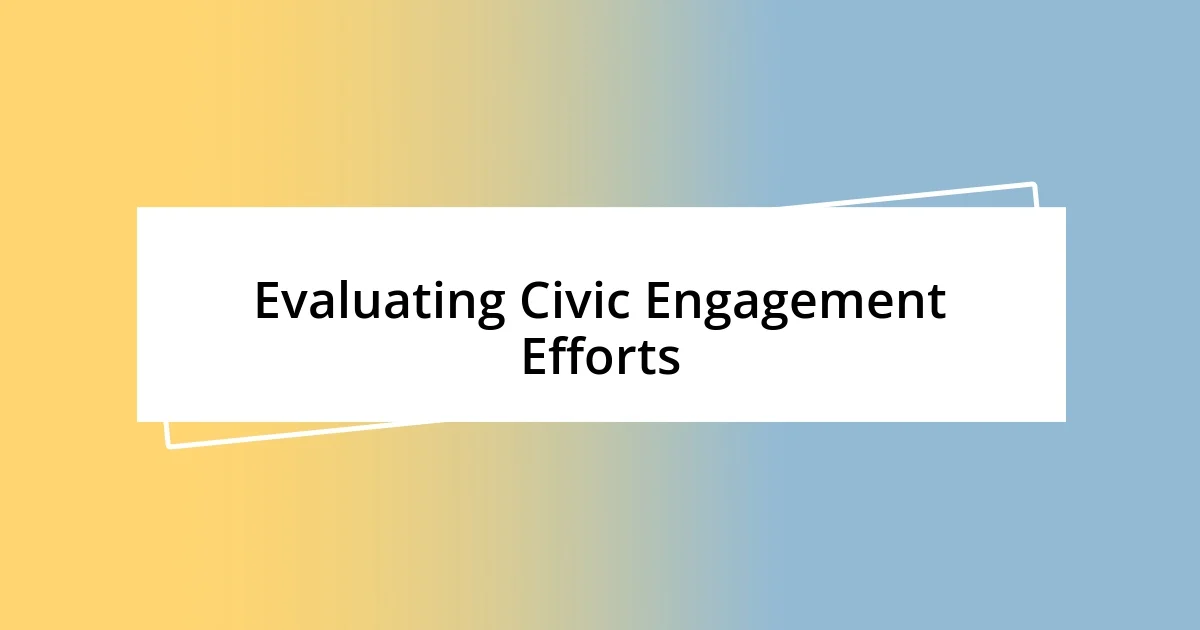
Evaluating Civic Engagement Efforts
Evaluating civic engagement efforts is crucial to understanding their impact. I remember volunteering for a local initiative where we conducted surveys to gauge community satisfaction with recent projects. Analyzing the feedback not only showed us what worked but also highlighted areas needing improvement. Isn’t it fascinating how data can transform our understanding of community needs?
Another aspect I find vital is the ongoing assessment of participant involvement. During one project, we tracked attendance and engagement levels over time, which revealed surprising insights about consistent participants versus those who dropped out. This data helped us tailor sessions to increase engagement and ensure everyone felt heard. Have you ever noticed how sometimes, the quietest voices hold the most valuable perspectives?
Lastly, I believe it’s important to celebrate successes, no matter how small. After one of our events, we hosted a gathering where everyone shared their experiences and feelings about their contributions. The atmosphere was electric. Collectively reflecting on our achievements not only boosted our morale but also inspired future participation. Isn’t it amazing how acknowledging progress can create momentum for even greater civic engagement?”
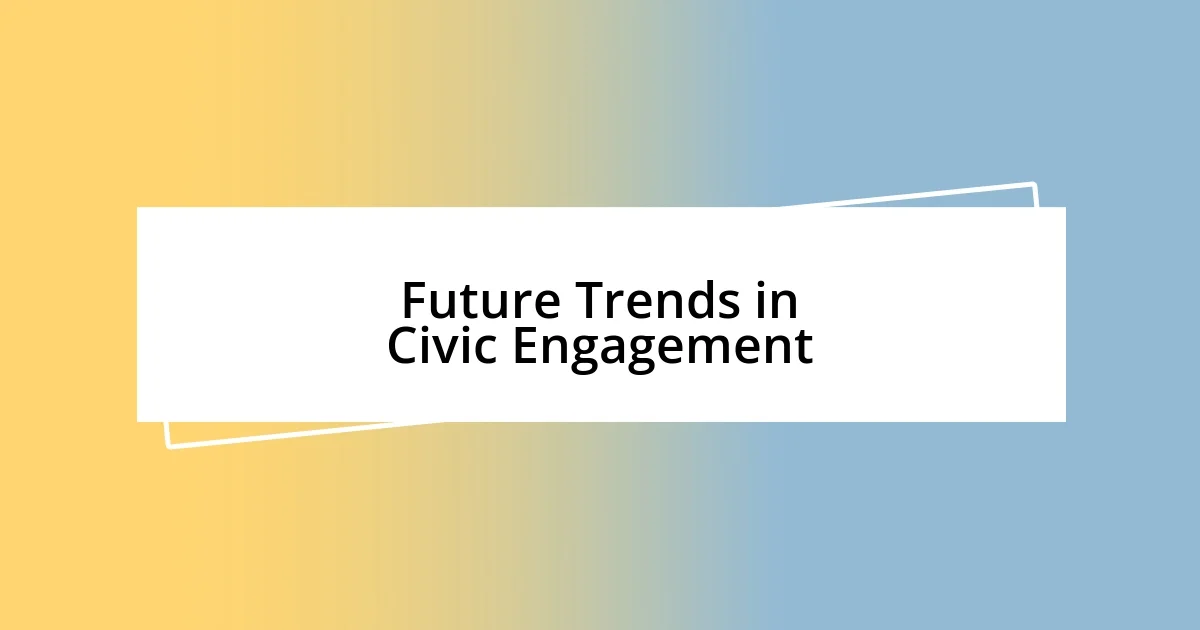
Future Trends in Civic Engagement
The future of civic engagement is increasingly intertwined with technology. I recently attended a workshop focused on virtual reality applications in public forums, and it struck me how immersive experiences could transform discussions. Imagine putting on a headset and walking through a simulation of proposed city development—wouldn’t that bring the issues to life in a way that blueprints never could?
As we move forward, inclusivity seems to be a driving trend. I participated in a project where we actively sought out voices from marginalized communities through targeted outreach. The feeling of sitting down with someone who had previously felt unheard was incredibly powerful. It made me realize that genuine engagement means creating spaces where everyone’s voice can resonate. How might our communities change if we truly elevate these perspectives?
Moreover, I perceive a growing emphasis on sustainability within civic initiatives. Last month, I joined a local clean-up campaign that wasn’t just about picking up litter; it included educational talks about the environmental impact of community actions. This holistic approach inspired participants to see civic engagement as a long-term commitment. Have you noticed how addressing environmental concerns can unite diverse groups in ways we hadn’t imagined before? It’s an exciting landscape ahead, where every initiative has the potential to build a better tomorrow.





